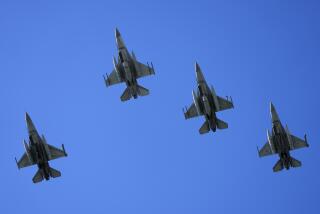Tanker bidding under attack
When the U.S. Air Force recently launched its third attempt to award a $35-billion contract for aerial refueling tankers, Pentagon officials said the competition would be fair and transparent.
But it was only a matter of days before the process was under attack.
Interest groups, politicians and the contenders -- Boeing Co. and Northrop Grumman Corp. -- began blasting the way the bids were evaluated, prompting some defense industry analysts to question whether the Air Force would ever get its much-needed tankers.
“I don’t see how either of these two companies walk away being the sole winner of the contract,” said Loren Thompson, defense policy analyst for the Lexington Institute in Virginia. “The Pentagon says the competition will be objective, but that’s going to be hard. It’s a very complicated framework.”
Handing out one of the largest military contracts in U.S. history hasn’t been easy for the Pentagon. Twice it has held a competition to replace its fleet of 415 Eisenhower administration-era Air Force refueling tankers, and both times it has failed amid accusations of underhanded politics and discriminatory rule-making. The process first started in 2001.
The tankers, modified Boeing 707 passenger jets, have enabled the U.S. to project its military might all over the world because they can refuel bombers, fighters and cargo planes in midair.
Last month, the Pentagon unveiled the new criteria it would use to award the contract.
Just days later, Century City-based Northrop complained that the latest competition was flawed because its pricing information from the previous tanker bid was provided to Boeing by the government but it had not been given Boeing’s pricing information.
“It is fundamentally unfair, and distorts any new competition, to provide such critical information to only one of the bidders,” said Paul K. Meyer, Northrop’s vice president and general manager of advanced technology and programs.
The Pentagon immediately fired back, saying that “it created no competitive disadvantage because the data in question are inaccurate, outdated and not germane to this source-selection strategy.”
Then a collection of eight leaders from conservative groups went on the offensive for Chicago-based Boeing.
They collaborated on a letter that was sent to each member of Congress, asking them to factor in a recent World Trade Organization ruling that found that European Union governments illegally subsidized Airbus, whose parent company, European Aeronautic Defense & Space Co., is teamed with Northrop in the tanker contest.
“The illegal trade subsidies were specifically intended to enable Airbus to underbid its chief rival Boeing,” said Kerri Toloczko, senior vice president for policy at the Institute for Liberty. “If the only way you can win is by cheating, what does it say about your team? I don’t think the American taxpayer wants their hard-earned dollars going toward a company like that.”
The latest scuttlebutt has added to the nearly decade-long controversy that the Pentagon had hoped would end when it awarded a contract last year.
Boeing won the first contract in 2004, but it fell apart because of an ethics scandal that resulted in prison terms for a former senior Boeing executive and a former high-ranking Air Force official.
The competition was relaunched and in 2008 Northrop took home the $35-billion contract to build 179 tankers based on a modified Airbus A330 passenger jet.
It was a huge upset since Boeing had built all of the tankers in the current fleet.
Northrop said the contract award would have created more than 7,500 jobs for California’s struggling aerospace industry, even though the planes would be assembled in Alabama.
But the decision was overturned after the Government Accountability Office found that the Air Force mishandled the yearlong competition by failing to credit Boeing, which had offered a tanker based on its 767 airliner, for some of its plane’s capabilities.
Defense Secretary Robert Gates was hoping to avoid similar problems, said James McAleese, a lawyer in McLean, Va., who specializes in defense contracts.
“It appears that the secretary worked very hard to be objective,” McAleese said.
He pointed to the 373 mandatory requirements and 93 optional provisions the bidders have to consider to secure the contract. With criteria this precise, it leaves little room for variation between the two companies.
So the competition is centered on price, McAleese said, as opposed to previous contests in which “price was secondary.”
“It’s a significant deviation from the previous competition,” he said. “Price is the primary discriminator.”
The Air Force wants to announce a winner by mid-2010. However, judging by what has gone on in the last two competitions, a midyear announcement isn’t very likely, said aviation analyst Richard Aboulafia of Teal Group Corp.
“This proposal is a lot clearer and more straightforward, but the bad news is it doesn’t get rid of the outside problems, namely, politicians,” he said.
Sen. Jeff Sessions (R-Ala.) has pushed for the Pentagon to select Northrop, which would build the tankers in his state. He recently introduced an amendment that would require the Air Force to release pricing information of previous bids from both Northrop and its partner. On the other side, Sen. Patty Murray (D-Wash.) has backed Boeing and asked the Pentagon to be mindful of the WTO ruling.
Amid the hyper-politicized atmosphere, a “split-buy” may be the only workable option, Aboulafia said. Under a proposal being pushed by Rep. John P. Murtha (D-Pa.), each company would get to build 12 of their planes a year. The downside is it could cost about $2 billion more annually, but it could break the stalemate, he said.
“Everyone’s trying to legitimize why their side should win and why the other side shouldn’t,” Aboulafia said. “Both have justifiable reasons, but it’s possible that they could create perpetual gridlock.”
--
More to Read
Inside the business of entertainment
The Wide Shot brings you news, analysis and insights on everything from streaming wars to production — and what it all means for the future.
You may occasionally receive promotional content from the Los Angeles Times.











